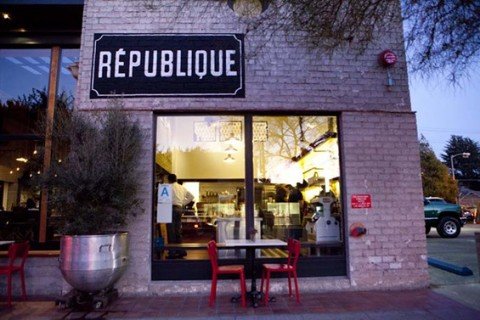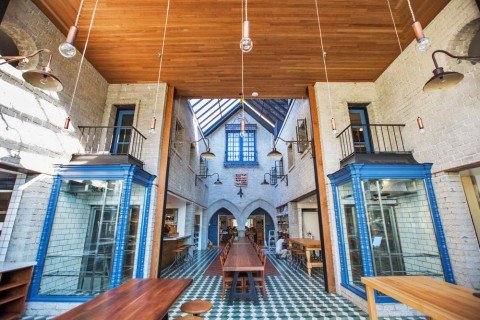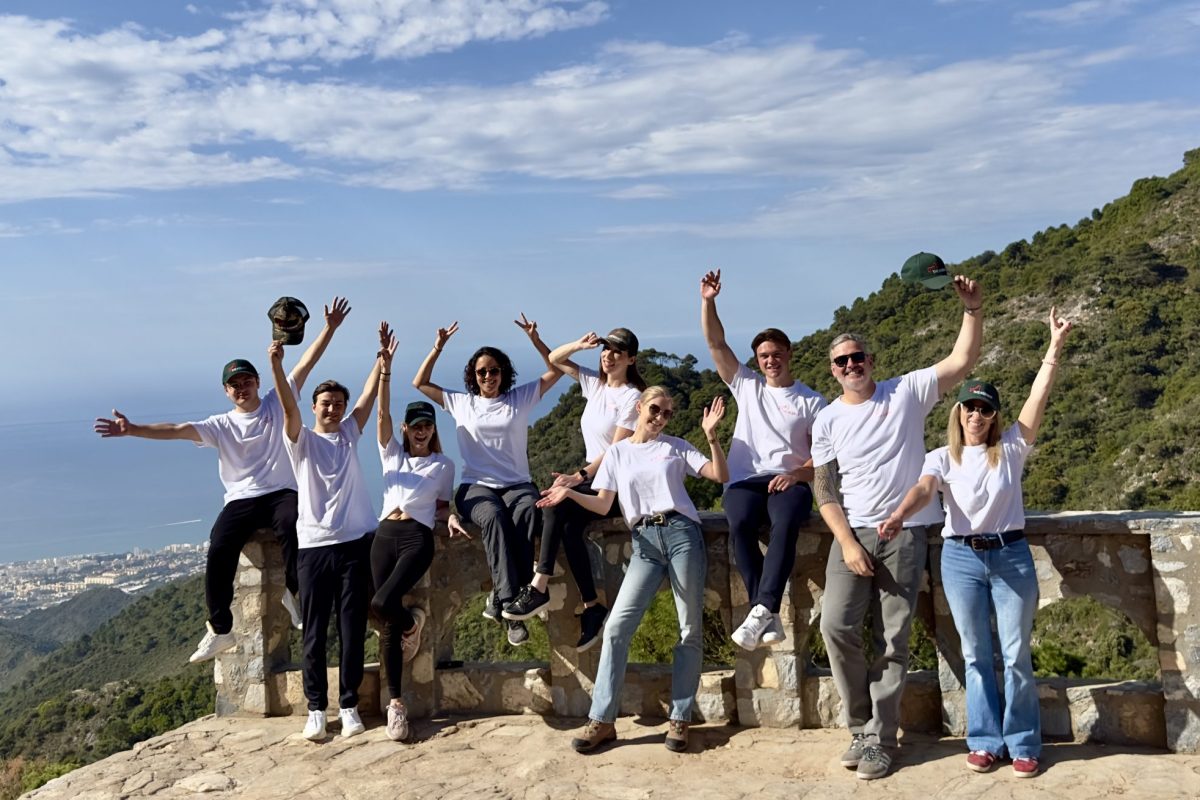This week I was able to steal Taylor Parsons away for a glass of vino and a casual chat. This was no easy task, as he is the conductor of the food and wine orchestra that is Republique LA. Taking over the old Campanile space on La Brea, a culinary institution of Los Angeles for many years, Republique – in just over a year since opening their doors – has firmly positioned itself in the conversation of best restaurants in the entire city. As a longtime friend (and client), I can confidently say that Taylor is on the shortlist of best wine and food minds of anyone I’ve ever met – and I’m real picky.
Taylo r has a dual role at Republique. He’s not only the General Manager, but he’s also the Wine Director. Due to the massive amount of responsibilities and immense workload these two functions require, these roles are never combined. To effortlessly execute both on the scale that Republique consistently delivers, speaks tremendously of this man’s vast knowledge and skillset. I’ve always admired and learned a ton from his approach to wine, and thusly I was excited to delve deeper into the history and philosophy of this great native Angeleno. On most evenings, you’ll find Taylor harmoniously bouncing from table to table, pairing wines and educating guests in a way that a chess savant plays multiple opponents simultaneously in Santa Monica’s Chess Park. He’s all that you want in a sommelier. He’s knowledgeable, sharply opinionated, and incredibly thoughtful. The following is a transcription of our conversation in its entirety, every question and answer, from our time spent at the chef’s table during that short calm between lunch and dinner service. I learned a lot, and I know you will too. Hope you enjoy…
r has a dual role at Republique. He’s not only the General Manager, but he’s also the Wine Director. Due to the massive amount of responsibilities and immense workload these two functions require, these roles are never combined. To effortlessly execute both on the scale that Republique consistently delivers, speaks tremendously of this man’s vast knowledge and skillset. I’ve always admired and learned a ton from his approach to wine, and thusly I was excited to delve deeper into the history and philosophy of this great native Angeleno. On most evenings, you’ll find Taylor harmoniously bouncing from table to table, pairing wines and educating guests in a way that a chess savant plays multiple opponents simultaneously in Santa Monica’s Chess Park. He’s all that you want in a sommelier. He’s knowledgeable, sharply opinionated, and incredibly thoughtful. The following is a transcription of our conversation in its entirety, every question and answer, from our time spent at the chef’s table during that short calm between lunch and dinner service. I learned a lot, and I know you will too. Hope you enjoy…
BB: Taylor, I know you’re an LA Native. Where’d you grow up, and how’d your family make it here?
TP: I grew up in Westwood and Mandeville Canyon. My mother moved here to get out of Montana, and my father is from Stockton. He came to LA to attend USC and a career in public relations.
BB: Why did you choose to live in Los Angeles?
TP: [He smirks] Well, I came back here for a woman. I was living in Madrid for a little over 2 years. I was playing music there. I was in several different bands, and my plan was to stay. I was in a group in college [Brown University] that went on tour in Europe, and I met a guitar player out there. He said come to Spain when you’re done and we’ll start a band. That’s what I did.
BB: So, how’d you find your way into hospitality?
TP: I was a waiter all through school. Music doesn’t really pay consistently. When I came back to the US, I was a ski bum for a while in Lake Tahoe. While there, I ended up taking a job in a store, a hippy grocery store actually, and I ended up becoming their wine buyer. I got really deep into it very fast. I decided to move back to LA to make a life for myself. I was considering law school …thought maybe I’d be a teacher. I took a job selling wine for one of the distributors I bought a lot from up north. I did that for four months, and was really bad at it. I wanted to go back to restaurants. I walked into Campanile one day and said you need an assistant manager [to Jay Perrin], and he hired me. Six months in, I became the wine director.
BB: Wait. How does that happen? How’d you quickly learn enough to become the wine director of such a highly regarded culinary institution?
TP: I’m pretty serious about things when I like them. It got intense quickly.
BB: Do you think Los Angeles is a global destination for food and wine, and if so, what is leading that charge?
TP: I do. I think Los Angeles has one of the greatest casual dining scenes of anywhere in the country. I don’t think we really compete at the top-top level. We don’t have a great [Michelin] 3-star of New York or Chicago, but I think we do have the best mid-tier casual dining restaurants. Houses like Bestia. And, Sotto is fantastic. Certainly, one of the things I really love the most about LA is how diverse it is. If you look it up on Wikipedia, something like 50 countries have their largest population of people living outside their native country here in LA. We have some of the best Chinese, certainly the best Japanese, great Thai, Cambodian. All Pan-Asian food, we kill. Our Latin food is pretty outstanding, and of course Mexican. We have an incredible array of the world’s cuisines here, so that makes us a melting pot. Chefs are able to do a lot with different kinds of food. It’s a fertile environment. From Cevicheria on Pico, to Taco trucks, to Korean BBQ, to Middle Eastern food…it’s all great.
BB: When do you think the moment was that you decided that wine would be your path? I mean, I know the exact moment when I turned the corner with wine. Was there an instance when that happened for you? And, why do you love being a Somm?
TP: I wish I could say there was a bottle, but there just wasn’t. When I was at Campanile I tasted a ton. Day and night. But, I’ve always loved wine my whole life. And, as a waiter and bartender, I loved selling wine. When you’re able to talk to someone about what they’re looking for and provide them with a product that becomes a connection point for a memory, an experience, it’s a very powerful thing. To create a memory is a very intense and profound responsibility.
BB: Ok. You said you love wine. Why? What about it specifically?
TP: I can’t think of anything that we make as a species that puts so much information into such a small package. A book, maybe. But, wine is an agricultural product, so there is a relationship to the land and organic material that isn’t present in a book. A bottle of wine can tell you technical information about a grape, a cultural philosophy of production and style, a moment in time, the weather in a place, a place itself, the soil in the ground. It can teach you stuff about flavors and aromas, and it can elevate food…which we all need. And, it’s delicious. It’s a lot. And, for someone like me, it turns on a lot of parts of my brain. It’s sensual, but it’s also very intellectual, it’s historical, it’s agricultural. A lot of elements of life are in a bottle of wine.
BB: I’ve been looking forward to asking you this question. If I was going to ask anyone this question, you’re the guy I ask —
TP: Let’s go.
BB: What region do you feel is putting out the best value wines in the world right now? Because I know it’s always been a philosophy of yours that “good is good.”
TP: The Loire Valley in France. I think if you’re looking regionally, you want to look for places that are making diverse styles of wine. I mean, you could say Puglia [in Italy] is making amazing value wines right now, but they really only make only two kinds of wine, and they’re usually pretty ripe. The Loire is a big region. It makes everything from steely mineraly Muscadet, to relatively rich and earthy Cabernet Franc, to honeyed Chenin [Blanc] that can come as dry or sweet and everything in between. There’s Sancerre [Sauvignon Blanc] that’s grassy, crisp and cool, and Pinot that reads a little like Burgundy. They’re producing Gamay, which is a quaffable bistro wine, to a full range of natural wines. I mean, they even have sparkling wines that are Champagne-like and “Pet Nat” [Pétillant Naturelle), the hippy sparklings that are cloudy and funky, like soda on steroids. Oh, there are also rosés of all shapes and sizes. And, there all at super fair prices.
BB: Did not think you were going Loire there. What trend in wine is exciting to you now?
TP: We are at a very exciting moment in the wine making regions of synthesis. You had, for a long period of time, for lack of a better word “Parker-ized” wines. It was all becoming very overwrought, technical, big, and massive. They were very monolithic. Uninteresting, and just about power. And then, the antithesis of that came about; you can see this in California, in Champagne, in the Loire, in Burgundy, in Alsace, all over Italy, in Rioja…all the same. They went to wines that were mean and unfriendly, that were impenetrable, that were either under-ripe or under-fruited. Just unbalanced-
BB: So, you mean the wines we like?
TP: [He laughs] Well yeah, the wines we like. But, I’m undergoing the same thing personally. It’s like when you first get into music, you love the commercial pop on the radio, and then you listen to horrible punk that makes no sense and is mean. Then, you grow up a little bit and realize that’s good, but you like the commercial stuff too and there are other kinds of music out there that you’ve never heard. So, you listen to everything as long as it’s good and it’s what you’re in the mood for.
BB: What do you think has prompted that change?
TP: We’re coming out of stage where a lot of California and French wines were being made in a very austere style. You know, the wines were very thin. Which, isn’t a bad thing. I like to drink a bit, so I like low alcohol wines, but I think now we’re approaching a time where winemakers are not trying to make wine like that because it’s supposed to be that way. They’re just trying to make wine that tastes good.
BB: So, this synthesis, you think is a meeting in the middle of sorts?
TP: I do.
BB: Do you think that’s a representation of consumers becoming more sophisticated and knowledgeable about wine?
TP: Yes. Consumers are getting smarter about wine. And, consumers of wine are getting younger. Younger people tend to have more open minds. They’re more amenable to try new stuff. I think that’s a positive trend. But, more than that, I feel that wine makers are now trying to make wines in a style that is not en vogue.
BB: If someone wants to spend $20 or less on a bottle of wine, and it’s not the supermarket, off the top of your head, what would you recommend?
TP: What I do, when I’m in that situation, is ask the person who works there. I do the same thing in restaurants. I ask for the Somm. Because, no one knows the inventory better than he or she, or the salesperson at the local wine shop. Let them lead.
BB: You’ve done a lot of wine-driven private dinners at Republique. Can you tell me what goes into the decision making process of the selected wine, and more specifically, the winemakers you choose?
TP: Yes. We’ve done a lot of them actually. We try to do one a month. I took this concept from my time at Mozza. It was part of the culture there to have regular experiences with winemakers or owners. It’s a very unique and fantastic experience to sit with a winemaker and have dinner. To talk to them about how they make their wine and why, what their life is like, and what their estate is like. And, why they make the wine the way they do. Wine is a cultural and creative expression. To sit with the wine creator is a pretty awesome thing.
BB: Next, I want to do a lighting round. One-word answers. Seriously, one word.
TP: Okay.
BB: New World or Old?
TP: (Long Pause) Old.
BB: Favorite restaurant in LA right now?
TP: Night + Market.
BB: France or Italy?
TP: France.
BB: Austrian or German whites?
TP: (Another long pause) German.
BB: Acid or Tannin?
TP: Acid.
BB: Should all wine be decanted?
TP: No.
BB: Do those little stupid aerators work?
TP: No.
BB: If there could only be one grape varietal left in the world, what should it be?
TP: Chardonnay.
BB: From Burgundy?
TP: No, from Champagne. Ok. Or Burgundy.
I wanted to keep going, but Taylor had to rush off to oversee preparation for service and meet with the front of house staff. Moving forward, I’m going to continue to profile big wine personalities in Los Angeles to bring more ideas, philosophies, and flavors to this blog. Next time we meet, we’ll return to education and the deepening of your wine palette and understanding. Cheers for now, from the Sommelier Selection!
And, don’t forget to follow me on Facebook and on Instagram for all the latest pockets and Pinots.



